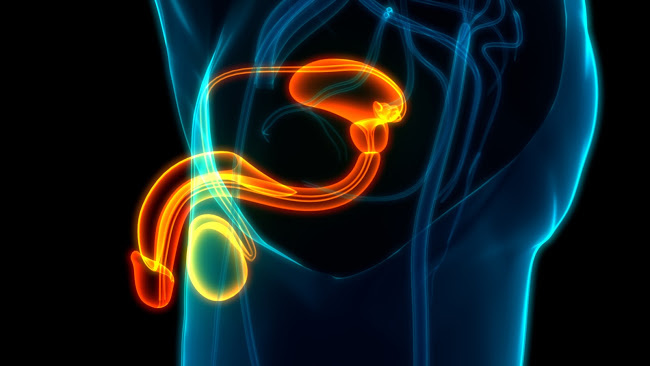
How Does Hormone Replacement Therapy Help Alleviate Menopause Symptoms?

Menopause is a natural transition that occurs when a person has gone at least 12 months in a row without menstruating (without birth control intervention). This is due to all of the oocytes (egg cells) in the ovaries being released, and usually occurs around age 50, with transitional symptoms (perimenopause) beginning in the mid-40s (U.S. averages). In some cases of oophorectomy, when both ovaries are removed, menopause may begin early.
Due to the loss of oocytes, the ovaries no longer produce the same amount of hormones as before. This leads to symptoms like hot flashes, dry or thinning skin, vaginal dryness, emotional changes, weakened bones, a reduction in sex drive, and more.
There are quite a few methods to try to help alleviate these symptoms, like taking vitamins, regular exercise or dieting. Some women may also consider some lubricants as relief from vaginal dryness. However, one of the most effective options for treating menopause symptoms is hormonal therapy.
Menopause Hormone Therapy (MHT)
MHT, also known as hormone replacement therapy (HRT), provides the hormones that are no longer being produced naturally:
Estrogen- The primary hormone in females, estrogen is usually recommended for those without a uterus or who have had an oophorectomy. It works by replacing the estrogen that is no longer being produced by the ovaries or oocytes. This is what helps to reduce sexual dysfunction and regulate moods, sleep, and other symptoms of menopause like hot flashes and migraines.
The loss in estrogen can cause heart problems, and bone weakening, so adding it back into your system may help reduce the risk of heart disease or osteoporosis. Estrogen therapy can come in a variety of forms, including pills, patches, gels, creams, and vaginal rings.
Progesterone- The second important hormone for the female reproductive system, progesterone helps regulate menopause symptoms like bad sleep and hot flashes. Progesterone therapy can also help reduce the risk of uterine/endometrial cancer. With only estrogen, the uterine lining may begin overgrowing cells, and because the lining is no longer being shed by a period, this may lead to cancer. Progesterone usually comes in pill form, and sometimes creams or an intrauterine device (IUD) can be used instead.
Testosterone- Women tend to lose testosterone during the cycle of menopause. With that, it’s common for women to experience loss of energy, libido, and strength. Adding testosterone back into your system can help improve sex drive, sexual satisfaction, energy, mood, and muscle strength. In Europe and Australia, testosterone replacement is available to women as gels, creams, and pellets. Unfortunately, testosterone replacement is still considered off- label use for women in the USA, and there is currently no FDA- approved testosterone products for women yet.
Risks and Benefits
Risks of MHT include:
- Fluid retention,
- Nausea,
- Muscle cramps,
- Headaches,
- Increased risk of blood clots and stroke (with estrogen taken by mouth),
- Increased risk of breast cancer (with long-term use).
Benefits of HRT include (if started within 10 years of menopause or by age 60):
- Improvement of chronic insomnia,
- Resolution of vulvovaginal atrophy (a condition in which the tissues lining the inside of the vagina and vulva become thin, dry, and inflamed) and vaginal dryness,
- Preservation of bone density and skin elasticity, which can be negatively affected by menopausal collagen reduction,
- Lowered risk of diabetes,
- Improved mood,
- Decreased risk of heart diseases,
- Improved mental health,
- Decrease in bad cholesterol.
Key Points
Overall, MHT generally helps to improve overall quality of life in peri-menopausal, menopausal, and post-menopausal individuals. Adding estrogen, progesterone, and testosterone back into the body helps improve vaginal health; vasomotor symptoms like hot flashes, cold flashes, and sleep disorders; and overall health risks like cardiac disease, bone loss (osteoporosis), and cognitive functions.
Along with healthy habits, MHT is a great option for managing not only the symptoms of menopause, but also for preventing menopausal changes. If you are concerned about menopause, it may be beneficial to speak with your healthcare provider.
References:
- Banks, N. K. (2024, March 18). Menopausal hormone replacement therapy. Practice Essentials, Overview, Symptoms and Effects of Menopause. https://emedicine.medscape.com/article/276104-overview
- Davis, S. R., Baber, R., Panay, N., Bitzer, J., Cerdas Perez, S., Islam, R. M., Kaunitz, A. M., Kingsberg, S. A., Lambrinoudaki, I., Liu, J., Parish, S. J., Pinkerton, J., Rymer, J., Simon, J. A., Vignozzi, L., & Wierman, M. E. (2019). Global consensus position statement on the use of testosterone therapy for women. Climacteric, 22(5), 429–434. https://doi.org/10.1080/13697137.2019.1637079
- Estrogen: Hormone, function, Levels & Imbalances. Cleveland Clinic. (2022, February 8). https://my.clevelandclinic.org/health/body/22353-estrogen
- Fait, T. (2019). Menopause hormone therapy: Latest developments and clinical practice. Drugs in Context, 8, 1–9. https://doi.org/10.7573/dic.212551
- Hormone therapy for Menopause. Cleveland Clinic. (2024a, March 12). https://my.clevelandclinic.org/health/treatments/15245-hormone-therapy-for-menopause-symptoms
- Low testosterone in women: Causes, symptoms & treatment. Cleveland Clinic. (2023, April 12). https://my.clevelandclinic.org/health/diseases/24897-low-testosterone-in-women
- Menopause practice: A clinician’s guide. The Menopause Society. (2024, December 30). https://menopause.org/professional-resources/menopause-practice-textbook
- Progesterone: Natural function, levels & side effects. Cleveland Clinic. (2022b, December 29). https://my.clevelandclinic.org/health/body/24562-progesterone
- What is menopause?. Cleveland Clinic. (2024b, June 24). https://my.clevelandclinic.org/health/diseases/21841-menopause




